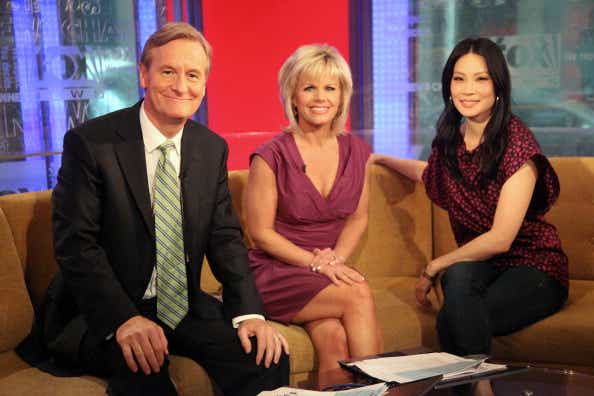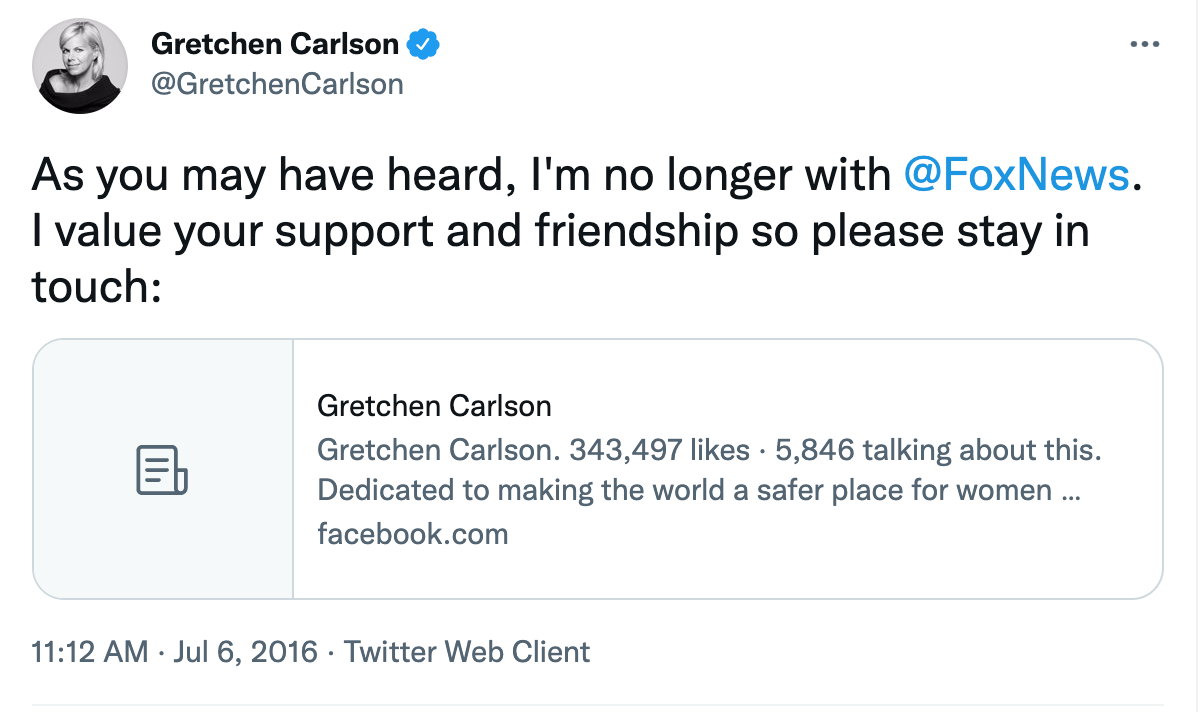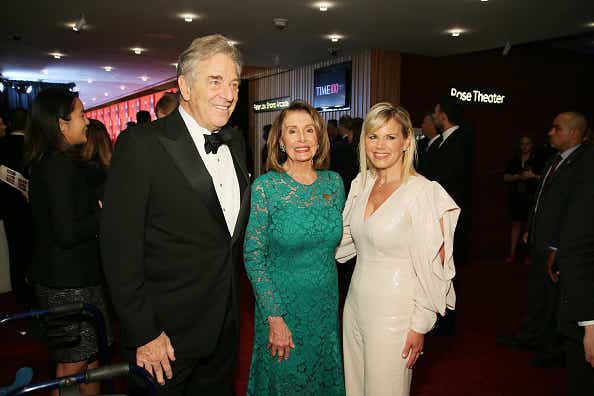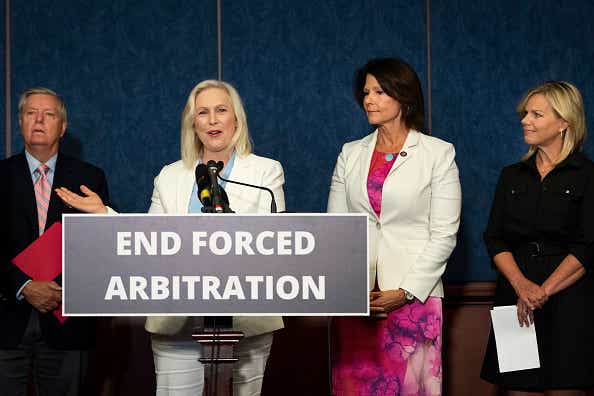In 2016, more than a year before the #MeToo movement got off the ground, veteran journalist Gretchen Carlson dropped a bombshell: She had filed a sexual harassment lawsuit against Fox News chairman Roger Ailes, claiming that she'd been fired after 11 years with the network for refusing Ailes’ sexual advances. Ailes denied the allegations, but Carlson’s claims opened the floodgates for scores of other women, including Fox contributor and political strategist Julie Roginsky, to come forward and accuse Ailes of retaliating against them for the very same thing.
Although Ailes passed away in 2017 and both Carlson and Roginsky have settled their suits with Fox, neither woman has been released from her Nondisclosure Agreement, or NDA, with the company. An NDA is a legally binding document historically meant to stop an employee from sharing sensitive company information (like its financial practices, or even the secret formula for a new salad dressing). The problem arises when NDAs are used for toxic purposes, like covering up sexual abuse and workplace misconduct.
After settling their lawsuits, Carlson and Roginsky wanted to help other victims of harassment. While “solving” the #MeToo crisis seemed like an insurmountable task, they realized one thing they could do: try to force companies to end the use of silencing mechanisms like NDAs, and thus keep monsters like Roger Ailes from continuing to prey on employees while fully protected by their companies.
The pair founded Lift Our Voices, a nonprofit organization aimed at eradicating the laws and business practices that prevent employees from publicly disclosing toxic workplace conditions. In July, Carlson reintroduced bipartisan legislation with the help of senators like Kirstin Gillibrand (D-NY) and Lindsey Graham (R-SC) to end forced arbitration. We spoke with Carlson and Roginsky about dealing with the fallout of confronting workplace harassment, who these practices impact most, and what every single employee should know before signing a contract.

Most of us are familiar with Gretchen’s story, but Julie, how did you get involved in Lift Our Voices?
Julie Roginsky: To quote Gretchen, “courage is contagious.” When she had the courage to jump off the cliff all alone and file her lawsuit in 2016, I was still at Fox, and I didn’t think she stood a chance. She was up against not just one of the most powerful men in media, but also this massive multinational conglomerate. Then she won. By persevering, she gave so many of us the courage to do the same. I filed my lawsuit about 10 months after Gretchen did, and I realized that those of us who are able to jump off the cliff have a responsibility to make sure that those who follow don't have the hard landing that we had.
Gretchen when you first decided to take action against Fox, there was no #MeToo movement, no blueprint. Why did you decide you needed to take action?
Gretchen Carlson: It wasn’t a decision I made at the flip of a switch. The first deciding factor was that I had the support of my family. At first, my parents really discouraged me from doing this — I grew up in Minnesota where everyone is kind, and suing people isn’t at the top of most people’s agendas. But when things got to a breaking point, they both called me, and we all cried and they told me that they were with me in whatever I had to do.
When I was fired from the career that I had killed myself over for more than 25 years, that was the final blow. I figured at that point, if I didn't stand up and talk about these injustices, who would?

What do you think the average employee needs to know before signing a contract?
GC: Understand what you’re signing. I had a forced arbitration clause in my last contract at Fox. Like millions of people, I had no idea what that was, and I am a highly educated woman. My agent at the time said, “Oh, don't worry about it. It's becoming the way of the world.” Well, unfortunately she was right. A forced arbitration clause takes away your right to an open jury process if anything bad happens to you at work. Arbitration is secret. There are not the same type of witnesses or depositions. There are no appeals. Often the arbitrator is selected by the very company that you are fighting against. Most lawyers will not even take a person's case if they have an arbitration clause, because they know that there's a minuscule chance that the arbitrator is going to rule in favor of the employee.
This is how companies have been able to cover their dirty laundry for gender discrimination, race discrimination, LGBTQ discrimination, sexual harassment, and sexual assault. This was never the intention of arbitration. Arbitration was supposed to be reserved for if you and your neighbor have a dispute over 300 bucks for a fence that they broke, without clogging up the courts. But companies figured out a way to turn that to their advantage and cover up these human rights violations.
The biggest problem with forced arbitration is that since you can't tell anyone, the predator gets off scot-free, and the accuser will likely be either blacklisted, demoted, or fired from the company. Of course, when you’re signing a contract that has an arbitration clause, nobody explains to you that if you’re harassed on the job, you’re screwed. Most people don’t even know if their contract has one or not.
I strongly believe that if you’re a 22-year-old right out of college, the onus should not be on you to say, “I'm not going to sign this contract if it has an arbitration clause.” Right away that sends a message to the employer that you might sue them down the road. But nobody goes into a new job thinking they’re going to get harassed or discriminated against.
What is Lift Our Voices doing to try to stop these workplace practices?
GC: We know that these issues predominantly affect women, and women of color, but we don't know who these women are, or which industries they're in, where they live, or what their income levels are. Nobody's ever bothered to do really detailed research on this, so we want to raise the money to be the organization to do that [you can help with these efforts by donating to to Lift Our Voices].
We also want to see if there's a correlation between the economic output of companies that use these mechanisms and whether they retain women and people of color in their workforce. Studies have shown that if you have a diverse workforce, you do better financially. We want to be able to prove to companies that removing these clauses is good for their bottom line. We’re also working with a number of schools to establish a curriculum to train the next generation of lawyers and business leaders to ensure that they foster a respectful workplace by not using silence mechanisms. Then of course we’re working on legislation at both the state and federal level. We spend a lot of time trying to recruit companies to get on the right side of history and join our mission. We’re also raising money to put together a grading system of companies to evaluate which companies silence their people and which companies don't.
Gretchen, when you look back on your career, did you ever think that this would be your legacy — being a leader for women in the workplace?
GC: Being one of the leaders against workplace sexual harassment is not something that you aspire to put on your resume, but my life took this crazy direction, and I’ve always been up for a challenge. I could have sat home after what happened and just hung out with my kids and my dog, but that wouldn't have been who I am at my core. Also, all these women started reaching out to me to share their own stories, and I realized, This is an epidemic. This is what they've been keeping from us, because they want us to feel alone.

Are there any women who you’ve heard from whose stories have particularly impacted you?
JR: A lot of women come to us who are bound by NDAs, and they have literally nobody else to talk to. I heard from two women who worked for the same global company, which is helmed by an incredibly wealthy, powerful man whose names we would all recognize. These women didn’t know each other, and they worked on opposite coasts.
The fear with which each of them told me about being been sexually harassed was worse than any story I'd heard. They truly lived in fear of this man and what he could do to them, but they weren't able to warn other women who worked in this company. That has always stuck with me. These women and men are bound by these silencing mechanisms, but also have this desire to warn others and are completely helpless. And this man is still very much in power.
GC: Many of these women can’t afford to take action because they fear they will be retaliated against or blacklisted in their industries and then lose their source of income. Most women who've been silenced don't have the same platform or resources that we have. So we’re standing up and speaking out about our own stories, for the millions of people who are voiceless. A lot of them don't look like us: Black women file harassment claims with the EEOC at three times the rate of white women.
Do you think this is a political issue?
JR: Absolutely not. Often you hear employers talk a very good game about the #MeToo movement, and workers' rights, and being pro-labor, while behind closed doors they or their senior leaders are predators. Women who’ve been victimized are constantly forced to sit and listen in silence as their companies talk about how progressive they are. I cannot tell you the psychological toll that takes on a person.
GC: This is a bipartisan issue, but we also have bipartisan opposition. So many companies and leaders who claim to be progressive and in favor of workers' rights refuse to get rid of NDAs and forced arbitration. Predators come in all shapes and sizes and from every political party. Just look at what happened with Andrew Cuomo.

Do you think the Cuomo situation was handled effectively, and if so, why?
GC: What happened to Andrew Cuomo is proof that independent investigations work. A lot of companies hire law firms that they know will come in and just give them a clean bill of health. Since the Cuomo case was independent, people could be subpoenaed, and some people who didn't even want to tell the truth had to speak. It’s also crucial to note that none of the women who worked for him signed NDAs, although I'm sure Cuomo wishes they did now.
Neither of you have been released from your NDAs at Fox. Why?
JR: Gretchen and I signed an NDA as part of our settlement, but the vast majority of people sign NDAs on their first day of work. We can't specifically talk about Fox, so I'll speak broadly. This really became a phenomenon after Anita Hill spoke at Clarence Thomas’s confirmation hearing. What companies felt was, “Oh my God, we cannot afford to have an Anita Hill situation.” So they started putting silencing mechanisms in place like arbitration and the very expanded use of NDAs, to make sure that no one could ever come forward.
GC: My message to Fox News is that if you've changed, as you publicly declare that you have, and everything is clean now, then why don't you let us out? I'll let you speculate about the answer to that question for yourself.









